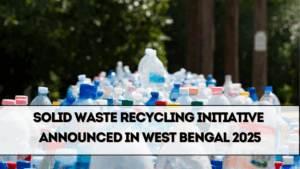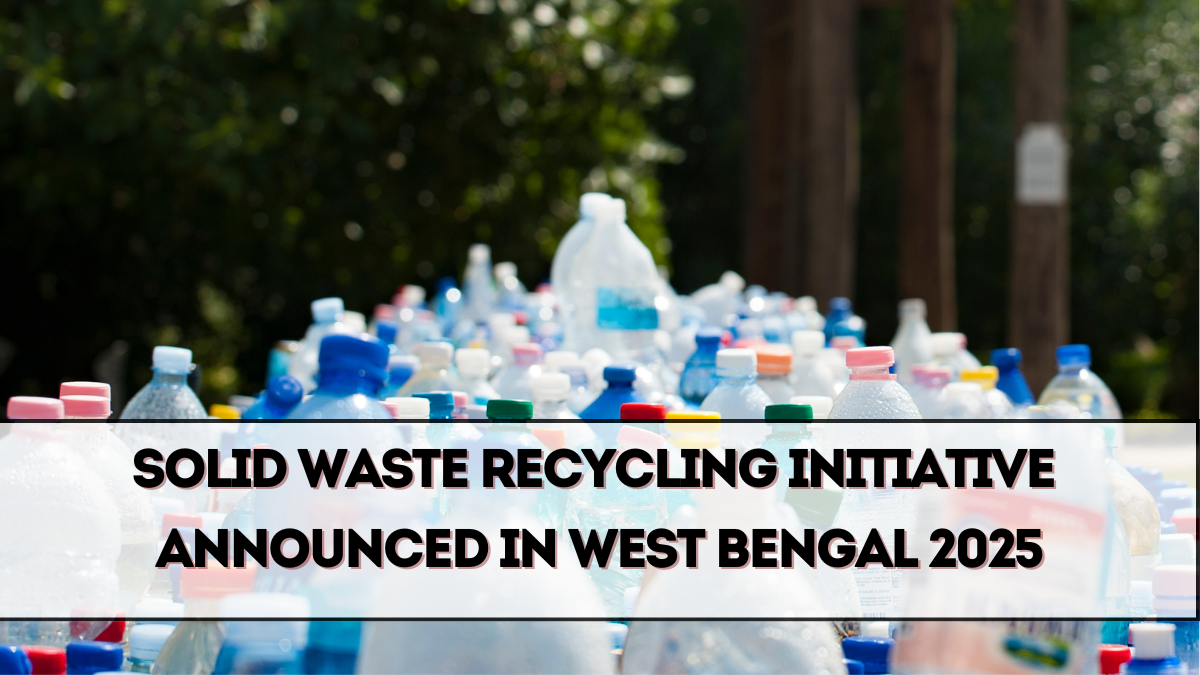Solid waste management has been a long-standing challenge in India’s urban areas, especially in states with rapidly growing populations like West Bengal. In response, the state government has introduced the Solid Waste Recycling Initiative 2025, a transformative program designed to modernize urban waste management and promote sustainable living practices. This initiative marks a significant step toward building cleaner, greener, and healthier cities while also creating employment opportunities through recycling industries.

The Need for Recycling in Urban Projects
Urban centers in West Bengal generate thousands of tons of waste every day. Most of this waste ends up in landfills, causing pollution, health hazards, and loss of valuable land. The introduction of structured recycling systems is essential to:
-
Reduce landfill pressure.
-
Reuse and recycle materials like plastics, metals, and glass.
-
Create eco-friendly energy from organic waste.
-
Encourage citizens to participate in waste segregation.
-
Promote sustainability in line with national and global climate goals.
The urban projects under this initiative not only address environmental concerns but also contribute to better civic amenities and improved quality of life.
Key Features of the Solid Waste Recycling Initiative 2025
The program has been carefully designed to cover all aspects of waste collection, segregation, and recycling. Some of its highlights include:
-
Segregation at Source: Citizens must separate wet waste, dry waste, and hazardous waste at household and commercial levels.
-
Smart Bins and Collection Systems: Municipalities will install smart bins with sensors to monitor waste levels and optimize collection routes.
-
Recycling Plants: New recycling plants are being established in urban areas to handle plastics, metals, and e-waste.
-
Organic Waste to Energy: Composting units and bio-gas plants will convert organic waste into fertilizers and renewable energy.
-
Public Awareness Drives: Campaigns to encourage households, schools, and businesses to participate actively.
-
Digital Tracking: A centralized platform will track waste collection, segregation, and recycling in real-time.
These measures ensure the initiative is practical, efficient, and transparent.
Benefits of the Recycling Initiative
The Solid Waste Recycling Initiative brings multiple benefits for the state, environment, and people:
-
Cleaner Cities: Reduced littering and better waste management infrastructure.
-
Job Creation: Employment opportunities in collection, recycling, and plant operations.
-
Environmental Protection: Reduced pollution, fewer landfills, and improved air quality.
-
Energy Generation: Renewable energy from organic waste helps meet urban energy needs.
-
Public Health Improvement: Reduced exposure to harmful waste-related diseases.
Such benefits directly support the government’s mission of making West Bengal a model state for urban sustainability.
Role of Municipalities in Urban Projects
Municipal corporations and local bodies are at the forefront of this initiative. Their responsibilities include:
-
Coordinating waste collection and transportation.
-
Establishing partnerships with recycling companies.
-
Monitoring citizen compliance with segregation rules.
-
Running awareness campaigns at the community level.
-
Reporting progress to state authorities.
The collaboration between municipalities, private recycling firms, and NGOs ensures smooth implementation across districts.
Citizen Participation – A Key Factor
The success of the Solid Waste Recycling Initiative 2025 depends heavily on active public involvement. Citizens must:
-
Practice waste segregation at home.
-
Reduce single-use plastics and switch to eco-friendly alternatives.
-
Participate in municipal awareness drives.
-
Use official recycling centers instead of dumping waste illegally.
By adopting small daily habits, individuals can contribute significantly to the overall success of the program.
Comparison with Previous Efforts
Earlier waste management policies in West Bengal focused mainly on waste collection and disposal. Recycling was often limited to informal sectors. The 2025 initiative is far more comprehensive, integrating technology, structured recycling, and government oversight. Unlike past projects, this one emphasizes accountability through digital tracking and incentivizes citizens for compliance.
Challenges in Implementation
Despite its strong design, the program faces challenges such as:
-
Lack of awareness among rural-urban migrants.
-
Limited infrastructure in smaller towns.
-
High initial costs for recycling plants and technology.
-
Ensuring consistent citizen participation.
To overcome these, the state government is planning collaborations with private firms, subsidies for plant setups, and large-scale awareness campaigns.
Future Roadmap of Recycling in West Bengal
The Solid Waste Recycling Initiative 2025 is only the beginning. The future roadmap includes:
-
Expanding recycling plants to all districts.
-
Introducing waste-to-energy power plants for large cities.
-
Incentive-based programs for households that practice segregation.
-
Partnerships with global organizations for advanced recycling technologies.
-
Achieving zero-landfill cities by 2030.
These steps will make West Bengal one of India’s leaders in sustainable waste management.
FAQs
What is the Solid Waste Recycling Initiative 2025 in West Bengal?
It is a government program aimed at improving waste management through segregation, recycling, and energy generation.
How will urban projects under this initiative help citizens?
They will create cleaner cities, generate jobs, reduce pollution, and provide renewable energy from organic waste.
Do citizens need to participate in waste segregation?
Yes, segregation at source is mandatory for all households and businesses to ensure effective recycling.
What are the long-term goals of this initiative?
The long-term goals include zero-landfill cities, better air quality, and advanced waste-to-energy technologies by 2030.
Click here to know more.
